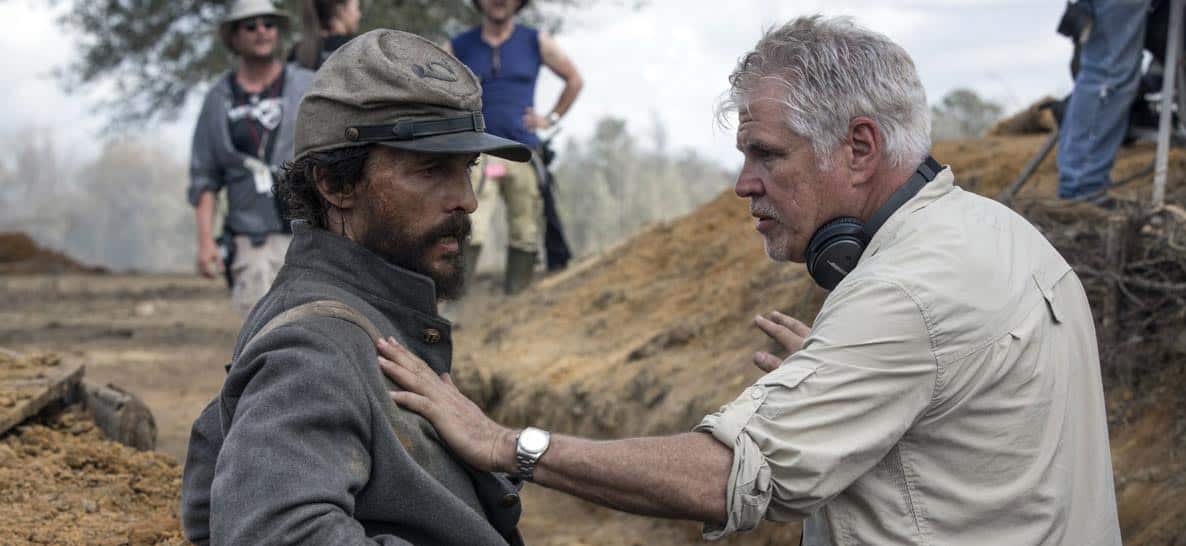
Sometimes violence is the answer. At least, according to Free State of Jones, the Civil War epic that hits theaters today. The film tells a long-forgotten, true story of poor white farmers and runaway slaves in Mississippi who rebel against the Confederacy after soldiers steal their livestock, crops and forcibly conscript boys as young as 12 into military service.
Whatever direction you lean in politics and theology, this movie is bound to make you uncomfortable. Eight-year-old girls take up guns. The book of Galatians is used to justify an ambush. The brutality of rape is dealt with, multiple times. Slavery, as many times as we’ve seen it on film, is gut wrenching in a fresh way. And protagonist Newton Knight (portrayed by Matthew McConaughey) constantly dances on the line between killing in self defense and outright revenge and murder, all while citing God and the Bible for his actions.
In short, this is not a go-to movie for pastors looking for sermon examples. But it’s also not a story that could have been told without the portraying the faith of these rebels against the rebellion. Christianity is woven into the fabric of this country, including the chapters where it’s difficult to tell if anything being done in the name of Christ is in fact Christ-like.
If Free State of Jones, written and directed by Gary Ross (The Hunger Games, Seabiscuit) had been released a decade ago, it would have been just a movie. But in 2016, it’s impossible to watch without filtering through the lens of the debate over the Confederate flag, Black Lives Matter and even modern day policing.
A Question (About a Flag) that Demands an Answer
The fact that this movie arrives a year, almost to the day, after the massacre carried out by Dylann Roof against nine African-American churchgoers in Charleston, SC only adds to the intense emotions that Free State of Jones evokes.
Roof’s terrorist act pushed the state of South Carolina in particular, and the country in general, to pick a side on the hot-button issue of the use of the Confederate Flag.
Just last week, the Southern Baptist Convention condemned the use of the Stars and Bars, as a direct response to the actions of Dylan Roof. “Does this change the game as it applies to the crushing issues of racial injustice around us? Of course, it does not,” writes influential SBC leader Russell Moore. “But at the same time, we cannot dismiss this as just about symbols. Symbols matter.”
The SBC is the second-largest denomination in the United States, only to Catholicism, so the decision is bound to cause ripples throughout mainline Evangelicalism. The louder the conversation around the flag becomes, the less likely Christian leaders will be able to sidestep the issue all together, for fear of offending one side in the debate.
The only state to still fly a version of the flag is Mississippi, which incorporates the Confederate X into its state flag. It’s ironic given the fact that Newton Knight’s impromptu army tore down the “blood stained banner” and replaced it with the Stars and Stripes in the towns they freed from Confederate control.
While the SBC is to be commended for going first, it was still an example of the church following the general culture, rather than leading the change. However, there are still plenty of opportunities for the Christians to step out first. Hundreds of monuments to slavery still stand throughout the Southeast, such as Jefferson Davis High School in Montgomery, Alabama, where a student population that’s 94 percent black attends classes in a building that honors a man who claimed the horrors of slavery.
Davis, the leader of the Confederate States, wrote that “slavery was established by decree of Almighty God … it is sanctioned in the Bible, in both Testaments, from Genesis to Revelation … it has existed in all ages, has been found among the people of the highest civilization, and in nations of the highest proficiency in the arts.”
In an age where Christians are increasingly seen as intolerant, bigoted and out of touch, leading the charge in removing the ghosts of slavery from our public places would be a great step to reconciling with an increasingly hostile, mainstream culture. Or, we can do and say nothing, and reinforce the growing stereotypes. But if Free State of Jones is a hit in theaters, it’s one more sign that saying and doing will be judged harshly by the world around us.
Violence in the Name of God
Matthew McConaughey says he was drawn to the film because Newton Knight “had such a clear identity of what was right and what was wrong. He couldn’t ignore wrong. Newt was a guy that, once his bell was rung, he couldn’t unring it. He would never not right a wrong on behalf of the consequences being too tough.”
In the film, once Newt’s “bell is rung” he picks up a rifle. At first, only to defend the property of his neighbors, whose property and children were being taken by force. But as his Robin Hood-like band of impoverished white farmers and runaway slaves grows, Newt starts a war within a war, and employs questionable tactics to accomplish noble ends. And he frequently uses the Bible to explain his actions.
It’s likely to produce a negative reaction with some millennial Christians, many of whom gravitated toward the pacifism of Shane Claiborne as a reaction to the atrocities of the war in Iraq. But there’s a major generational difference here.
Today’s Christians can condemn a war they see as unjust from behind the comfort of a keyboard or smartphone, with the actual violence taking place thousands of miles away. Newton Knight lived in a world where violence, rape and murder were daily occurrences. A decision not to take up arms against the oppressors was essentially signing off on allowing these things to happen to his (literal) neighbors.
Free State of Jones is an excellent film forces the viewer to take at difficult issues that are both very old and very timely. Although there’s plenty of room for differing opinions in the Christian faith, this film is one more piece of evidence that wherever you land, believers can no longer sit on the sidelines when it comes to issues of race, civil rights and how we interpret our past.






















